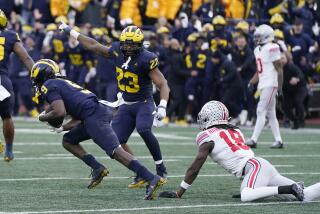After NFL Calls Off this Week’s Games, Most Other U.S. Sports Follow Suit
- Share via
Swayed by mounting public opinion and the National Football League’s decision to postpone all 15 weekend games, all major college football schools that had planned to play Saturday in the wake of terrorist attacks on the United States reversed field Thursday and postponed their games.
There were 55 scheduled games involving Division I schools this weekend, three of them marquee matchups in Florida: No. 13 Washington at No. 1 Miami; No. 8 Tennessee at No. 2 Florida and No. 10 Georgia Tech at No. 6 Florida State.
However, a Division I-AA game, Columbia at Fordham, had not been postponed as of Thursday afternoon. Both schools are in New York City.
A phone message left with the Fordham athletic department was not immediately returned.
Wednesday, the Big East and Atlantic Coast conferences announced they would postpone all weekend games.
Other conferences, among them the Pacific 10, had planned to play a limited schedule, and the Southeastern Conference was set to play its full slate of games. The NFL’s announcement, however, set off a domino-like sequence of college postponements, with no school apparently wanting to be left isolated against a growing tide of public sentiment.
“It had a very significant impact,” Western Athletic Conference Commissioner Karl Benson told the Associated Press.
In the morning, South Carolina and Bowling Green called off their game, and that announcement was soon followed by postponements for the Fresno State-Utah State, Illinois-Louisville and Washington State-Colorado games.
The Mid-American Conference, citing an emerging national consensus, postponed all four of its scheduled games. The Big Ten and Big 12 followed suit and soon all major college games were off.
The SEC did an about-face only a day after its commissioner, Roy Kramer, had released a memo outlining the reasons football should be played. Kramer cited direct contact with the White House, saying he had been encouraged to “move forward.”
Kramer added that the conference would have a “very meaningful expression of mourning and sympathy,” but added it was important to “move forward and not allow terrorists to change our way of life or restrict our freedom.”
He said Wednesday of his conference’s decision to play, “We are following the guidelines of the President of the United States, not the guidelines of the Southeastern Conference.”
However, the SEC’s united-we-stand coalition weakened Thursday as other conferences began postponing, and the SEC office announced all games were off.
“The conference continues to believe this country must begin the healing process following the horrendous events of this past week and will evaluate all future schedules at an appropriate time,” the SEC release said in part.
The SEC also reconfirmed its commitment of $1 million to “assist the victims of this event.”
Flip-flop?
Wednesday, Louisiana State Chancellor Mark Emmert supported the decision that his school host Auburn on Saturday night.
“Indeed, as Americans we will not allow our feelings to be infringed by terrorists. We are going to continue doing those things that Americans do,” Emmert said.
Thursday, LSU Coach Nick Saban said in a statement, “There are more important things than a football game and this is one of those situations right now.”
On a Wednesday conference call of conference commissioners, Tom Hansen of the Pac-10 lobbied to postpone all games this weekend.
“I tried to convince the others that as the week goes on, I think the emotions will mount,” Hansen said. “I think when the totals are released on the number of dead, it’s going to be devastating.”
Yet, in Hansen’s conference, Washington State had decided independently to host Colorado on Saturday and Oregon State was prepared to host Montana State.
Why were those Pac-10 schools willing to play?
It’s a complicated situation.
The NCAA is not a true governing body in college football, which is in essence controlled by the six major conference commissioners, university presidents and the television networks that sponsor the Bowl Championship Series. The NCAA had no option but to leave the question of playing up to the individual conferences and schools, and not every school has the same agenda or problems.
It was easy to hail the Big East and Atlantic Coast Conference decisions to postpone all football games this weekend, yet it was also fairly easy for those conferences to reconfigure their schedules. That was not the case in the Pac-10.
Washington State and Oregon State have been, traditionally, the poorest revenue-producing schools in the Pac-10, yet are the conference schools that probably will not be able to make up this weekend’s home games.
Washington State has a bye Oct. 20, but Colorado plays at Texas that day. Colorado is off Nov. 17, but Washington State plays archrival Washington on that date.
The schools cannot play the game Dec. 1, because of the possibility that Colorado might be playing in the Big 12 championship game in Dallas. Yet, it’s also true Washington State President V. Lane Rawlins initially wanted the game to be played.
“These acts will have a permanent impact on our nation,” he said in a statement regarding the terrorists strikes. “However, it is also important that we not be defeated by them and that we move on with our lives and activities.”
Oregon State and Montana State were also in a bind. Both schools’ schedules were filled through Nov. 17, and Montana State could not play Nov. 24 because that’s the first weekend of the Division I-AA playoffs. The following Saturday, Dec. 1., is out because Oregon State is playing at Oregon.
On its Internet site, Oregon State officially called its decision a postponement, and Athletic Director Mitch Barnhart said the schools would try to reschedule. While it may sound crass to consider financial concerns at a time of national mourning, both Oregon State and Washington State are facing an economic stomach-punch.
Football generates most of the money in athletic departments and is needed to finance non-revenue-producing sports. Oregon State started the season with only five home games after North Texas backed out of a game with the Beavers to play Oklahoma last weekend for more money. Oregon State filled the Sept. 8 opening by playing at New Mexico State.
For now, Oregon State is left with only four home games: UCLA, Arizona, California and Washington. Might the Pac-10 be able to reimburse Oregon State and Washington State for the gate losses?
Assistant commissioner Jim Muldoon said that was possible but it had “not been suggested at this point.” The Pac-10 receives roughly $34 million in television revenue from ABC and Fox.
More to Read
Go beyond the scoreboard
Get the latest on L.A.'s teams in the daily Sports Report newsletter.
You may occasionally receive promotional content from the Los Angeles Times.











